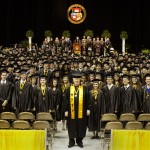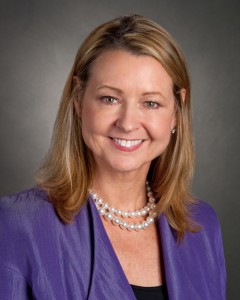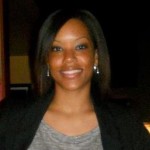The Missouri School of Journalism Will Recognize 550 Graduates at May Commencement
The Ceremony Begins at 6 p.m., Saturday, May 12, in Mizzou Arena
Columbia, Mo. (May 7, 2012) — The Missouri School of Journalism will welcome its 550 May and August graduates at its upcoming commencement ceremony. It begins at 6 p.m., Saturday, May 12, in Mizzou Arena. Seating will be open. Family and friends do not need tickets.

Graduate degrees will be awarded to three doctoral candidates and 71 master’s recipients, seven of whom earned their degree online.
Of the 476 graduating seniors, 215 studied strategic communication; 81, magazine journalism; 76, radio-television journalism; 57, convergence journalism; 30, print and digital journalism; and 17, photojournalism.
Overall, 165 graduating seniors, approximately 35 percent, will be recognized with Latin honors, which are awarded to undergraduates with a 3.5 or higher grade point average for their last 60 graded credit hours.
The top 10 percent of the school’s graduates will be invited to join Kappa Tau Alpha, the national honor society for students majoring in journalism and mass communication. The Kappa Tau Alpha reception will be held from 3 to 4:30 p.m., Saturday, May 12, in room 100 of Reynolds Journalism Institute. This year’s inductees are:
| PhD Student | MA Students | |
|
|
|
| BJ Students | ||
|
|
|

The alumna speaker will be Cynthia J. Brinkley, BJ ’91, the vice president of global human resources for General Motors. In this role, Brinkley leads corporate human resources and diversity strategies and key initiatives designed to drive business results and support GM’s 210,000 employees worldwide.
Brinkley joined GM from AT&T Inc. where she was senior vice president, talent development and chief diversity officer. She was responsible for identifying and developing future leaders, company-wide training, building the new AT&T University, employee engagement and diversity management.
Brinkley’s extensive career also includes serving as president of AT&T Missouri and AT&T Arkansas. In addition, she held a number of significant positions in AT&T (SBC) federal relations and communications, including representing AT&T (SBC) and its subsidiaries in policy and legislative matters before Congress.
A native of Milan, Mo., Brinkley also holds a bachelor of science degree in political science from Truman State University. She is active on numerous national boards and co-chaired the University of Missouri‘s billion-dollar fundraising campaign.

The master of ceremonies will be Aundrea Rogers, a strategic communication major, business minor from Park Forest, Ill. A Dean’s List student, Rogers worked as the marketing development coordinator for Mizzou Spirit’s Zou Crew, a mentor for the Mizzou Black Women’s Initiative, a ResLife Ambassador for the Department of Residential Life and in the library at the MU School of Law. She served as a summer intern with the American Bar Association in Chicago.

The student graduation speaker will be Jonah Javad Mirfendereski, a radio-television journalism major from Boston. He has reported and anchored for KOMU-TV and won a 2011 Mid-America Emmy Award for student production. He also received six regional Mark of Excellence Awards, including four first-place finishes, from the Society of Professional Journalists in 2012. Mirfendereski received the national Radio Television Digital News Directors Association Lou and Carole Sports Reporting Scholarship as well as the Meredith-Cronkite Fellowship. He has interned at ESPN, worked for Newsy.com and served as assistant sports director for MUTV.
The Gaudeamus Brass Quintet, a group of professors from the MU School of Music, will provide the instrumental music. The group tours regularly and performs at music conventions, festivals, high schools and universities including international performances in Moscow and St. Petersburg, Russia.
Add 9, a men’s acappella group at MU, will sing the national anthem and alma mater at the start of the ceremony.
Cindy Brinkley, BJ ’91, Commencement Address
Missouri School of Journalism
May 12, 2012
Dean Mills…distinguished faculty and administration…honored guests…parents, families, and friends…and most importantly, members of the Class of 2012!
Thank you for having me here to speak with you this evening. It’s always a pleasure to be back on campus, and I’m honored to be part of today’s commencement exercises.
I remember very clearly when I sat where you sit today. I recall the excitement of graduation. And I recall the promise – and anxiety – I felt about starting my career.
Many of you will leave here today and step into your first jobs as professional journalists. It is a magical time, when possibilities are endless and the whole world seems to beckon.
I’m reminded of one of the first times I had the opportunity to hire an employee. I was working for Southwestern Bell in Texas.
After several rounds of interviews, I had all but selected the young woman I wanted to hire. She was professional, courteous, conscientious. Seemed like a great fit. As I gave her the good news, I said there were just a few formalities we had to take care of before she could start, including a drug test.
Suddenly, a very concerned look came over her face, and she shifted uncomfortably in her chair.
“Anything wrong?” I asked.
“Well,” she said. “This, uh, drug test? Is it something I can study for?”
Well, maybe if I worked for a pharmaceutical company it would be!
But this was the phone company – so I told her, “No, this is one test you cannot study for.”
Though, in retrospect, I suppose you could prepare, you know, if that’s something you needed to do.
But you know what? Over the years, I’ve discovered that what was true for that drug test is true for a lot of other things in life and in journalism.
You cannot “study” for The Arab Spring, or the “Occupy Wall Street” movement, or a hundred-year tsunami, or a new advertising challenge.
But you can “prepare” for them by learning your trade and honing your instincts.
More to the point, you, as journalists, have an awesome responsibility – in Walter Williams’ words, “a public trust” – to be fair, to be accurate, to report the truth.
Many of you will do even more than that. You will shape public opinion, you’ll set the tone for public discourse, you’ll make the world a better place.
You can’t study for those things, either.
But you can prepare for them. By mastering your profession. By being so good at what you do that you earn the chance to make a difference.
Let me suggest three things that experience tells me you will have to do if you are to make that happen.
First, you will need to play to your strengths.
And in the category of brutal truths, let me offer this: despite what the beer commercials tell us, you actually can’t have it all – at least not all at the same time.
In my experience, very, very few of us excel at many things. And I mean truly excel.
Instead, the really successful people I know are those who establish clear priorities in their lives, who understand that they can excel at only a handful of things in any one lifetime and who choose to focus on the very few things that they can do very well at this particular moment.
The hard truth is that people who try to be good in everything often wind up being memorable in nothing.
So, my advice is to make a big X in one box. Find what you’re good at – really good at – then play to that strength.
In truth, I think this is where diversity is leading us, a diversity based not on race or religion or ethnicity or gender. We’re moving toward a diversity of thought and experience – toward a society that is diverse in its abilities, as well as in its people.
As journalists, you’re in a unique position to help foster and lead this new type of diversity, to celebrate our individual and unique positions, and to make them your own as you focus your own career on what it is that you do best.
The second thing I suggest you do to prepare for making a difference is to pursue whatever it is you do with unbridled enthusiasm and passion.
By graduating from one of the finest journalism schools in the world, you’ve already shown that you have great abilities. It’s a huge achievement, something you should be proud of.
But let me offer another brutal truth: Ability alone is not enough.
In my experience – in business and in life – there are lots of really smart people out there. And what distinguishes those who really make a difference is enthusiasm and passion.
It’s what you do with your knowledge that really matters. It’s the passion and energy you bring to any endeavor that usually determines how far you will go.
So, get in the game and play hard!
You’ll probably make mistakes but that’s okay!
You’ll also learn, you’ll have fun, and in the end you’ll make a bigger contribution. You’ll gain that elusive thing that every employer wants and many parents fear, that thing called “experience.”
Mom and Dad, these young men and women are ready to fly! Mizzou has prepared them well, and it’s time for them to roll up their sleeves and get to work at what they do best and with all the enthusiasm and passion they can muster.
The last thing I want to suggest as preparation for making a difference is to know how to adapt.
Notice I didn’t say “compromise.” I said “adapt.”
Brutal truth number three: The prize does not always go to the strongest or the swiftest or the smartest. It often goes to the one who best adapts to our constantly changing world.
Woody Allen said that 80 percent of success is just showing up.
Well, you can’t show up if the world has passed you by.
Missouri’s own Mark Twain said that river boat pilots were the smartest people he knew.
To be a pilot on the Mississippi River, Twain said, you had to learn more than any one person could ever hope to know and then you had to learn it all over again the next day.
That was because the river’s currents and eddies changed so quickly. What you knew yesterday might not be the case tomorrow. You had to adapt to the river or the river would swallow you.
The currents each of you will face in your lives include new technologies, new discoveries, new ideas. And they will change throughout your life and your career.
I have to say that as I look out at this year’s graduates, I am encouraged that so many smart and capable young people are excited about journalism and strategic communication today.
Remember that The Journalist’s Creed does not quibble about the medium. It is concerned with content, with clarity, with fairness, with independence, with motivations.
Walter Williams wrote: “I believe that the journalism which succeeds the best – and best deserves success is a journalism of humanity, of and for today’s world.”
Well, “today’s world” is changing quickly. But quality journalism is constant, whether you read it on paper or online.
Adapt to match the needs of the world around us and you will navigate the river of our times as adroitly as the river boat captains of 150 years ago.
I’ll close with a quote from Peggy Noonan, from her column on the death of Tim Russert.
She wrote that “in a way, the world is a great liar. It shows you it worships and admires money, but at the end of the day it doesn’t. It says it adores fame and celebrity, but it doesn’t, not really.”
“The world admires, and wants to hold on to, and not lose, goodness. It admires virtue. At the end it gives its greatest tributes to generosity, honesty, courage, mercy, talents well used, talents that, brought into the world, make it better.”
Thank you for allowing me to be a part of this very special day.
I congratulate you all and I wish everyone good health, much happiness and great success in the years ahead.
Now go out and make our world better!
Thank you.
Thoughts of the Class of 2012
Jonah Javad Mirfendereski
People often say, “You only live once.”
Four words that can lead to some of the best decisions you’ll ever make and some of the worst.
Late night trips to El Rancho fall somewhere in between.
But that’s the beauty of the phrase. One decision doesn’t define our lives.
It’s the collection of choices we make that creates a legacy. And, that’s the essence of only living once.
You see, what we did in the past affects what we do now.
And what we do now shapes what we’ll do in the future.
OK, yeah, that’s not too profound but think about it.
You decided to come to the University of Missouri to become a graduate of the Missouri School of Journalism.
You made the choice to a part of something special.
Not just Harpos on a Thursday or Mizzou Arena on a Saturday but the culmination of your time wearing black and gold.
Senior year of high school was the first time I ever visited the journalism school. I sat in on a broadcast 2 lecture. Yea, B2, Greeley Kyle, big guy, intimidating.
But while I sat in the back of class with my mom, quivering in terror of covering local news or posting a blog entry, my heart still knew, that’s what I want. So, OK Greeley, challenge accepted.
And whether you know it or not, that’s what every one of your hearts has done. In TV, radio, print, convergence and strat comm.
If I had told you four years ago, that you and 140 million others would use this thing called Twitter, you’d probably give me the same face after hearing some fever-inducing kid named Justin has 20 million followers.
That’s more than six times the U.S. armed forces.
We’ve experienced Mizzou move to the SEC, phones with 3g, 4g, Siri, whatever.
Our world is changing by the second, and as journalists, we have to keep up. But we’re not just journalists, we’re graduates of the top journalism school in the country. We don’t keep up, we’re one step ahead.
And it doesn’t take a Spidey sense to know, with great power, comes great responsibility.
With our education, we can take over newsrooms, PR firms, marketing firms, radio stations – anything we set our minds to.
As individuals, we’re just pawns on the chess board. Taking steps toward our childhood dream or just some job that sounds awesome.
But as a class, as a school, as alumni. We’re an unstoppable force.
Look around. Black gowns. Black caps. We actually are a Mafia.
Now it’s our time to advance the profession of journalism. To adhere to the ethics we learned so fervently. To practice what our professors preached. To create our own legacy.
So where do we go from here?
Well, our generation loves to say the words, “I know.”
Students, parents, esteemed faculty – his may come as a shock, but we don’t know. We don’t have a clue what lies ahead or what it holds.
But I’ll tell you what it does have – hundreds of graduates from the Missouri School of Journalism.
The army of north campus, the veterans of comm law, the survivors of J1010.
We learned it. Now it’s time to live it.
Congratulations Class of 2012, and welcome to the rest of your lives. You only live it once.
Updated: April 2, 2025